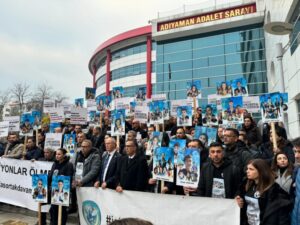
Among those attending the hearing were the families of the Champion Angels (the Famagusta students who died in the hotel), tour guides, and survivors who were injured in the collapse.
The session began with the defendants confirming their identities via video link. The plaintiffs’ lawyers requested that an expert report be submitted to the court and argued that the detained suspects should remain in custody.
A significant moment came when one of the defendants, architect Erdem Yıldız, changed his stance, accusing hotel owner Ahmet Bozkurt of being responsible for the building’s structural failings.
Bozkurt, however, maintained that he was not to blame, describing the disaster as a natural event, saying, “We are not at fault; this was completely a natural disaster“.
Pervin Aksoy İpekçioğlu, who also survived the collapse, told the court: “The building’s structural integrity was weak, and no static plan was provided when it was converted from apartments to a hotel. There should have been two lifts, and I personally saw them”. She argued that the collapse of the building and the deaths of 72 people were due to failings in the construction and planning process, which needed to be fully investigated.
Lawyer Yiğit Gökçehan Koçoğlu, representing the plaintiffs, insisted that there had been permit forgery, carried out in collaboration with local council officials. He called for the various cases to be merged so that municipal employees could also be held accountable. Koçoğlu argued that “samples were taken from the only remaining part of the collapsed building“, and claimed that poor concrete quality was to blame, saying, “If the hotel had been properly constructed, it wouldn’t have collapsed when neighbouring buildings remained standing“.
He pointed out that a recent ruling in a similar case in Adana, where poor building standards had resulted in deaths, found that the collapse was due to probable intent.* He urged the court to consider this precedent and argued against the release of the detained defendants, warning that it would complicate the ongoing investigations.
Hotel owner Ahmet Bozkurt, in his defence, said that he and his son had been imprisoned for 21 months and had suffered not only the loss of lives at their hotel but also of 300 family members in the earthquake. He asked for his release, stating, “We did everything correctly in building the hotel, but this was a natural disaster beyond our control“.
His son, Mehmet Fatih Bozkurt, also denied any wrongdoing and requested his release, claiming, “I reject all the charges against me”.
Architect Erdem Yıldız, who had been working on the hotel’s construction, contradicted Bozkurt’s defence, stating, “Bozkurt claims he used the best materials, but who did he hand them to? Most likely, he handled a lot of the construction himself”. He also confirmed there were two lifts in the building, challenging earlier statements.
*“Probable intent” is a legal term used in certain jurisdictions, particularly in cases where someone’s actions, although not explicitly intended to cause harm, were so negligent or reckless that serious consequences, like death or injury, were likely or predictable. [Ed.]



